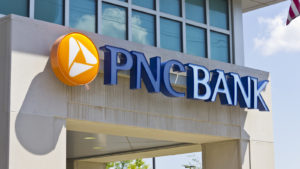There are a lot of different ways to play the stock market, especially now as the coronavirus from China creates extreme volatility. There are a ton of places to find bargain investments, but a good place to start is the financial sector.
Financial stocks have taken a beating over the past few days as lower interest rates and concerns about the broader economy weigh on investor confidence. However, contrarians comfortable with moderate risk may want to start making a short-list of bank stocks to buy.
Here’s a look at three bank stocks worth considering while the market is down.
Best Bank Stock to Buy: JP Morgan Chase

Nothing is safe when the market is as volatile as it is right now, but JP Morgan Chase (NYSE:JPM) might be just about as low-risk as they come. If this market meltdown does continue into a recession, JPM stock might be the best bank stock to hold.
Back in 2008 the firm not only weathered the financial crisis, but its solid financials allowed it to buy up some of the competition. The bank ended up coming out the other side as one of the industry’s strongest players.
Plus, it was recently rocked by news that CEO Jamie Dimon was rushed in for emergency heart surgery on Thursday. Dimon has been credited for JP Morgan’s success, making his absence a concern for investors. However co-presidents Daniel Pinto and Gordon Smith have been “deeply involved” in the firm’s strategy execution. Both men have been flanking Dimon for two years as the bank’s CEO has said he doesn’t plan to continue at the helm beyond 2023.
The firm’s strong position as one of America’s largest banks makes JPM a stable bet during times of instability. For now, JP Morgan looks like one of the best buys for contrarian investors that don’t want to make a speculative bet.
Interest Rate Resistance: Morgan Stanley

Morgan Stanley (NYSE:MS) is another good place for contrarians to look in the financial sector. Like JP Morgan, the bank may be a safer play than many of its peers. That’s because Morgan Stanley is unlikely to feel the same pain from lower interest rates due to its structure, which doesn’t depend as heavily on low-cost deposits.
Citigroup analyst Keith Horowitz said as much in a note to clients, noting that the bank’s beaten down price has made it a buying opportunity.
Clearly, there is near term uncertainty, but we believe investors with a longer term horizon should used this opportunity to be building positions in MS.
Indeed, MS stock’s losses make its future growth trajectory look even more enticing. Not only did the bank deliver solid Q4 results, but its planned purchase of E Trade Financial should help the firm effectively pivot toward wealth management. In the recent sell off, though, most of the enthusiasm surrounding Morgan Stanley’s strong future growth runway has been lost.
M&A Speculative Play: PNC Financial Services

There’s no question that banks are in for a difficult ride over the next year, especially if the Fed has another rate cut in store. Plus, the coronavirus’ impact on the economy has yet to be determined, something that could further weigh on the financial sector.
Regional banks will be the hardest hit by a downturn, so we’re likely to see M&A activity within that sector if the economy starts to crumble. Kevin Crowley, a Senior Finance Lecturer at Emory University, said he expects to see mergers within that segment rise in the event of an economy downturn.
For regional banks, more strategic M&A activity seems likely. If anything, the prospect of a slower growth environment will result in renewed pressure to find transactions that have the potential to deliver shareholder value. Consolidations can help to generate cost saving synergies and allow for more efficient investments in information technology, something that consumers are demanding.
PNC Financial Services (NYSE:PNC) looks likely to become one of the first buyers should its smaller peers start to struggle. When BBT and SunTrust merged last year, PNC lost its ranking as the 9th largest bank by assets. With a cash horde of $5.1 billion on its balance sheet, management might look to put that capital to use in the year ahead if economic instability persists.
It’s worth noting that PNC is the riskiest play on this list— M&A speculation isn’t for the faint of heart. However, if you’re able to take on a high degree of risk, PNC looks like one of the best regional banks to scoop up ahead of an economic decline.
